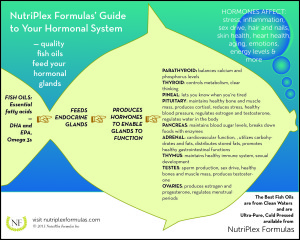When we feel unwell, we moan, roll over and ask ourselves, “What’s wrong with me?” But we’d rarely guess that our suffering might have anything to do with our hormones. Perhaps it’s because most of us aren’t aware of the extent to which hormones affect our health or even – other than playing a role in sexual function – what they are.
WHAT ARE HORMONES?
Endocrine glands take on the critical task of releasing hormones to be carried throughout our bodies. Hormones are special groups of cells that transmit messages from one tissue or organ to another, and use good fats and cholesterol to create both male and female hormones. The endocrine glands consist of the pituitary, pineal, thymus, thyroid, adrenals, and pancreas.
If the endocrine glands don’t immediately strike you as highly influential in your overall health, take a look at this list, which is only a fraction of the processes they put into motion:
- Maintenance of healthy muscle and bone mass
- Stress reduction
- Maintenance of healthy blood pressure
- Maintenance of healthy metabolism
- Regulation of mood (warding off anxiety depression, etc.)
- Regulating water balance in body
- Support of immune system
- Recognition of when it’s time to go to sleep
- Cardiovascular function
- Utility of carbohydrates and fats
- Upholding healthy gastrointestinal functions
- Controlling calcium and phosphorus levels in the body
- Balancing blood sugar levels
If you can think of all the problems related to stress alone (lowered immune system, lack of sleep weight gain, high blood pressure, and the list goes on) or maintenance of healthy muscle and bone mass (osteoporosis, arthritis, joint stiffness, decalcification, etc.), you can imagine the breadth of issues resulting from unbalanced hormones. Stress and maintenance of healthy muscle mass are just two of the many, many factors controlled by the hormones.
PUT THEM BACK IN BALANCE
There are a number of steps you can take to bring your hormones back into balance, though the preferred course of action is to do so naturally, without drugs (drugs tend to put one system in balance while their side effects disrupt the balance of another delicate system):
- Cut out or drastically reduce sugar intake – Sugar has been directly linked to stopping the communication processes of different hormones, such as insulin, meaning that sugar doesn’t allow hormones to do their very important jobs.
- Listen to your hormones (they communicate with you) – When you’re tired at night, sleep; when you’re hungry, eat (but don’t overeat); if you’re thirsty, drink something hydrating (e.g. water). Your hormones will tell you what they need. If you pay attention to them, your care will keep them in balance.
- Exercise – Regular exercise is crucial to balancing hormones, and thereby maintaining good health. Exercise stimulates your body’s production of endorphins. You may recognize these as the hormones that keep you happy and give you that exercise “high,” but they’re so much more industrious than that. They keep your immune system working optimally, your pain tolerance higher, your sleep restful, and so on. Aim to exercise at least three times a week, and remember that while cardiovascular exercise is important, weight training is also very important, as it releases a number of beneficial hormones that other types of exercise fail to do as effectively.
- Take Fish Oils
Because hormones are produced using good fats and cholesterol, it can be extremely helpful to bring your hormones back into balance by supplementing them with good fats. Just be sure you take quality oils. Bad fats, as well as omega-6 polyunsaturated fats, lead to a gradual destruction of hormonal health. Fish Oils contain omega-3 fats, which are the most needed oils to support hormonal health. Fish oils also contain two critically important fatty acids: EPA (eicosapentaenoic acid) and DHA (docosahexaenoic acid). DHA is proven essential to pre- and postnatal brain development, and EPA is influential in normal behavior and mood. Both DHA and EPA protect nerves throughout the body. And, of course these fatty acids play a critical role in a healthy hormonal system.
The are the “Bad Fats” to avoid: vegetable oils, canola oil, corn oil, peanut oil, margarine, soybean oil, and fried oils.
Fish oil should be from a source that is ultra-purified and cold-pressed from clean Arctic Waters – try Fish Oils by NutriPlex Formulas. They’re excellent for the skin, brain, mood, stress levels, wound healing, and immune system – all hormone activity.
The takeaway is this: When battling anything from the common cold to insomnia, from cardiovascular disease to emotional problems, and from acne to skin conditions, consider your hormones. Chances are, something is out of balance. Ask your healthcare provider for NutriPlex Formulas Fish Oils and a natural protocol for hormone health.

